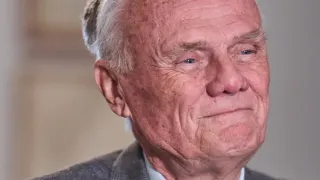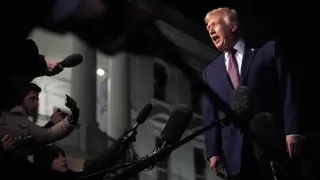May 4, 2021
US Appeals Court Considers Idaho Transgender Athletes Ban
Keith Ridler READ TIME: 3 MIN.
A U.S. appeals court on Monday gave little indication of how it might rule on the constitutionality of the first law in the nation banning transgender women and girls from playing on women's sports teams.
The three-judge panel of the 9th U.S. Circuit Court of Appeals heard virtual arguments in the case that could have far-ranging consequences as more states follow conservative Idaho's lead.
Idaho passed its law last year, and more than 20 states have considered such proposals this year. Bans have been enacted in Alabama, Arkansas, Mississippi, Tennessee and West Virginia. Florida lawmakers passed a bill, and South Dakota's governor issued an executive order.
On Monday, conservative Republican lawmakers in Kansas failed to override Democratic Gov. Laura Kelly's veto of a proposed ban on transgender athletes in girls' and women's school sports.
The judges on Monday focused at one point on whether the case was still relevant because one of the plaintiffs, Lindsay Hecox, had dropped out of Boise State University after failing to qualify for the women's cross country team. Her attorney said Hecox planned to return in the fall and try out for the team again.
Judges also questioned whether the other plaintiff, who feared invasive tests to prove her gender that are outlined in the law, had standing to sue because she is not transgender and her gender identity had not been challenged.
It's possible the court could rule the case is no longer relevant and dismiss it without ruling on its merits.
Roger Brooks, an attorney with a Christian conservative group defending the Idaho law, said he hoped that would not happen because the case needed a definitive ruling.
"This is a situation that is live and is going to be ongoing," he said at a news conference after the arguments.
Supporters say such laws are needed because transgender female athletes have physical advantages. Opponents say the laws are discriminatory and, in Idaho, an invasion of privacy because of tests required should an athlete's gender be challenged.
Lawmakers in Idaho also have argued that allowing transgender athletes on girls' and women's teams would negate nearly 50 years of progress women have made since the 1972 federal legislation credited with opening up sports to female athletes.
But those opposed to the ban have cited the same Title IX federal civil rights law that prohibits sex-based discrimination.
"Ultimately, this is (an Idaho) law that harms all women and girls," said Chase Strangio, an attorney with the American Civil Liberties Union, which is seeking to stop the law from taking effect.
The law prohibits transgender students who identify as female from playing on female teams sponsored by public schools, colleges and universities.
It does not apply to men's teams, which prompted one judge to ask whether discrimination existed.
"They're not barred," Judge Andrew Kleinfeld said. "Anybody can play on the boys' team whether they're transgender or not."
The ACLU and Legal Voice women's rights group sued last year on behalf of Hecox and an unnamed Boise-area high school student who is cisgender, meaning her gender identity matches the one she was assigned at birth.
The lawsuit contends the law violates the 14th Amendment's Equal Protection Clause because it is discriminatory and the Fourth Amendment's protections against invasion of privacy because of tests required should an athlete's gender be challenged.
A federal judge in Idaho temporarily blocked the law from taking effect last year. Idaho and the conservative Christian group that intervened, Alliance Defending Freedom, appealed.
The group is representing Madison Kenyon of Johnston, Colorado, and Mary Marshall of Twin Falls, Idaho, who run track and cross country on scholarships at Idaho State University and are concerned they could have to unfairly compete against transgender athletes.
The appeals court didn't indicate when it might issue a ruling.
___
This story has been corrected to show that the court panel met virtually, not in San Francisco.






